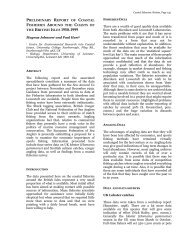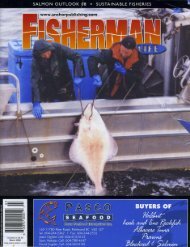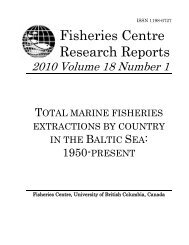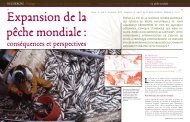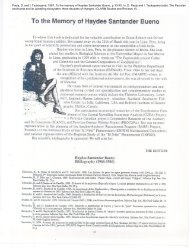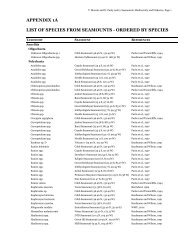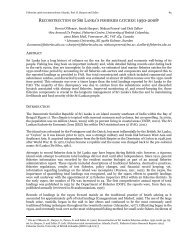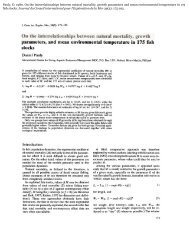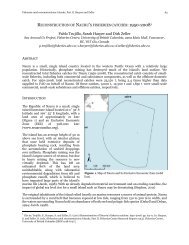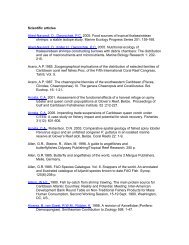Trends in GlobAl MArine Fisheries - Sea Around Us Project
Trends in GlobAl MArine Fisheries - Sea Around Us Project
Trends in GlobAl MArine Fisheries - Sea Around Us Project
You also want an ePaper? Increase the reach of your titles
YUMPU automatically turns print PDFs into web optimized ePapers that Google loves.
60<br />
More reasons for pessimism<br />
The pessimistic outlook for fisheries outl<strong>in</strong>ed<br />
above has antecedents, notably <strong>in</strong> Ludwig et al.<br />
(1993), who po<strong>in</strong>ted at the ease with which, <strong>in</strong><br />
the absence of a clear experimental context, field<br />
data from collapsed fisheries can forever be contested<br />
by the fish<strong>in</strong>g <strong>in</strong>dustry, a po<strong>in</strong>t developed<br />
further by Rosenberg (2003), and which, given<br />
the capture of management bodies by that same<br />
<strong>in</strong>dustry (see e.g., Okey 2003), leads to paralysis<br />
at best, and to cont<strong>in</strong>ued erosion of the resource<br />
base at worst. This problem, which is very real <strong>in</strong><br />
developed countries, many of which pride themselves<br />
of the way they <strong>in</strong>corporated science-based<br />
advice <strong>in</strong>to policy mak<strong>in</strong>g, appears largely <strong>in</strong>surmountable<br />
<strong>in</strong> develop<strong>in</strong>g countries, where science<br />
is a fragile import. In these countries, the great<br />
needs for food and <strong>in</strong>comes by large human populations,<br />
which should lead to more careful use of<br />
natural resources, <strong>in</strong> fact provide decision-maker<br />
with a ready excuse for what is, <strong>in</strong> fact, the whole-<br />
sale destruction of food production systems.<br />
Indeed, exports have become a major issue <strong>in</strong><br />
fisheries, with mar<strong>in</strong>e products be<strong>in</strong>g amongst<br />
the most heavily traded commodities (Pauly et<br />
al. 2002, Alder and Sumaila 2004). The general<br />
trend is that the shortfall of products from traditional<br />
fish<strong>in</strong>g grounds <strong>in</strong> the EEZ of developed<br />
countries is be<strong>in</strong>g compensated for by exploitation<br />
(often via distant water fleets) of develop<strong>in</strong>g<br />
countries (Pauly and Watson 2003). This implies,<br />
given the ‘debts’ that most develop<strong>in</strong>g countries<br />
have run with respect to <strong>in</strong>ternational lenders,<br />
that mar<strong>in</strong>e resources and their underly<strong>in</strong>g eco-<br />
systems suffer from <strong>in</strong>creased pressure. Examples<br />
are provided by the countries of West Africa,<br />
whose dependence on f<strong>in</strong>ancial support from the<br />
European Union forces them to agree to fisheries<br />
agreements provid<strong>in</strong>g access to European fish<strong>in</strong>g<br />
fleets under terms that appear rather unfair to<br />
these countries (Kaczynski and Fluharty 2002).<br />
Similar developments appear to be underway off<br />
East Africa (Jacquet and Zeller 2007a, 2007b).<br />
Another example is Argent<strong>in</strong>a, whose demersal<br />
resources, <strong>in</strong> the early 1980s among the few that<br />
were both large and underexploited, have now<br />
collapsed under the pressure of both national and<br />
<strong>in</strong>ternational fleets, licensed for their ability to<br />
generate foreign exchange (Sánchez 2002).<br />
Also important is the absence of <strong>in</strong>ternational<br />
<strong>in</strong>stitutions (i.e., set of rules) capable of action that<br />
would reverse, or at least halt, <strong>in</strong> <strong>in</strong>ternational<br />
waters, trends such as presented above, and impact<strong>in</strong>g<br />
on large pelagic fishes (see e.g., Pauly and<br />
Maclean 2003 for the case of the North Atlantic,<br />
where such <strong>in</strong>stitutions and organizations had a<br />
long time to develop, but didn’t). An exception<br />
could possibly be the World Trade Organization<br />
(WTO), as it is the only <strong>in</strong>ternational body with<br />
the ability to enforce its rules. As of this writ<strong>in</strong>g,<br />
WTO members are consider<strong>in</strong>g proposals to reduce<br />
or eventually even elim<strong>in</strong>ate subsidies for<br />
fisheries (Sumaila et al. 2007). The current, ‘Doha<br />
round’ of negotiations may fail, but the issue will<br />
rema<strong>in</strong> until it is resolved.<br />
Parrish (1995, 1998) developed rather pessimistic<br />
scenarios for the future of fisheries, argu<strong>in</strong>g<br />
that, given present trends and pressures,<br />
FISH, SUSTAINABILITY AND DEVELOPMENT



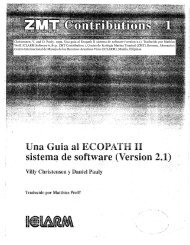

![Nacion.com, San José, Costa Rica [Nacionales] - Sea Around Us ...](https://img.yumpu.com/26166123/1/190x245/nacioncom-san-josac-costa-rica-nacionales-sea-around-us-.jpg?quality=85)
